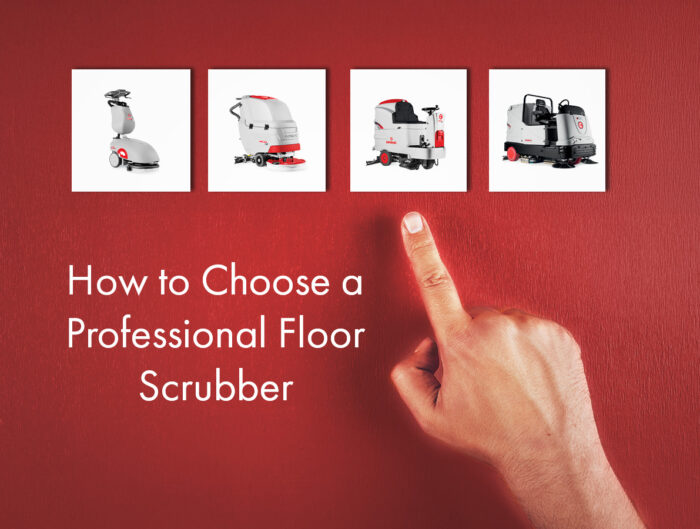When it’s time to choose a new pressure washer, one of the first questions to ask is: should you go for a gas or electric model? The answer isn’t always straightforward, as each type comes with specific features that make it more suitable for certain environments and cleaning tasks.
In this guide, we break down the pros and cons of gas vs electric pressure washers to help you decide which one best fits your professional or operational needs.
Electric vs gas engine: what’s the difference?
To decide whether a gas or electric pressure washer is the better choice, it’s important to understand the main difference between the two types of engines, or rather their power source:
- A pressure washer with an electric motor needs to be plugged into the power grid. It’s ideal for continuous use indoors or in areas where a power outlet is readily available.
- A pressure washer with a gas engine (also called combustion engine) runs on fuel—typically gasoline or diesel. This makes it completely independent from the electrical grid and perfect for outdoor work or remote areas with no access to electricity.
Choosing between a gas or electric motor for your pressure washer isn’t always straightforward, it depends on the type of job and working environment. Each option has unique features that make it more suitable for specific cleaning needs.
Gas pressure washers: pros and cons
Gas engine pressure washers are built to handle heavy-duty cleaning tasks, especially in demanding sectors such as construction, industry, agriculture, and maritime. Thanks to their combustion engine, they deliver high power, enhanced mobility, and unlimited autonomy, since they don’t rely on electrical outlets. This makes them the ideal solution when consistent performance is required in challenging environments or open spaces, like shipyards, boat decks, ports, or docks, far from any power source.
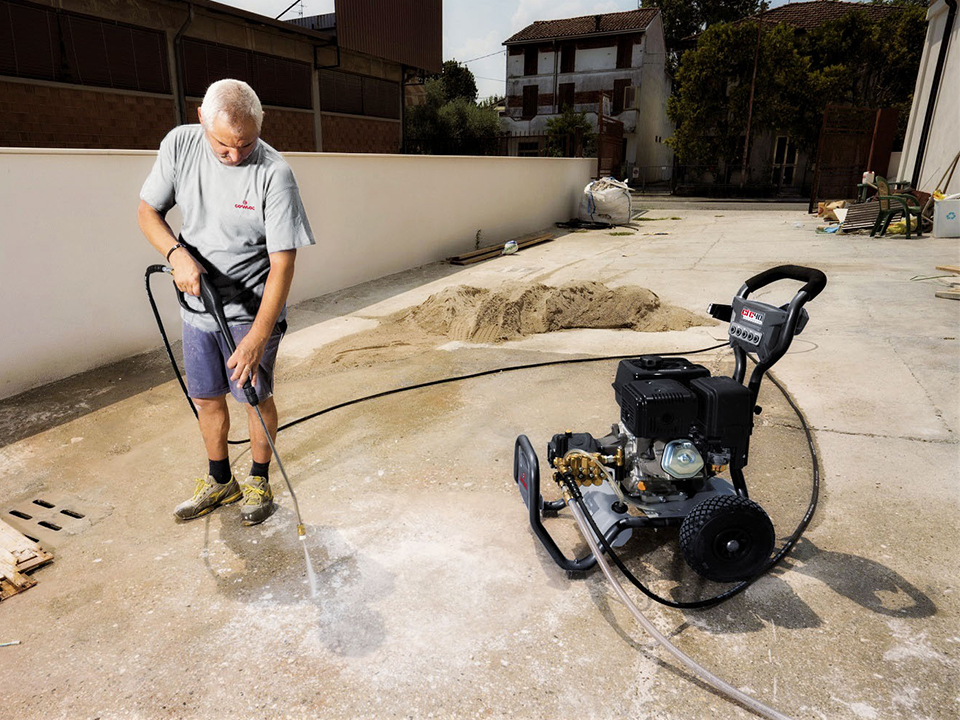
Advantages of gas-powered pressure washers:
- High power output: the gas engine provides the pressure and flow rate needed to remove stubborn dirt on large surfaces.
- Operational independence: they work without being connected to the electrical grid.
- Durable build: designed for frequent and intensive use in tough conditions.
- Versatile applications: ideal for outdoor environments, construction sites, roads, workshops, and industrial facilities.
- Total freedom of movement: since there’s no need for a power outlet, they can be used virtually anywhere, provided the area is well-ventilated and suitable for fuel-powered machines.
Disadvantages of gas-powered pressure washers:
- Noise and emissions: louder and subject to exhaust gas emissions compared to electric models.
- More maintenance required: the combustion engine needs regular maintenance.
- Bulkier design: while free from power cord limitations, they tend to be heavier and less maneuverable.
- Usage limitations in certain environments: they’re not recommended for indoor or poorly ventilated areas due to emissions.

Gas pressure washer: hot or cold water?
Gas engine pressure washers are available in both cold water and hot water versions, and the right choice depends on the type of dirt you need to remove. The most powerful models designed for professional or industrial use are often equipped with an integrated boiler, which heats the water to enhance cleaning performance. In these machines, the gas engine not only powers the pump but also provides the energy needed to maintain high water temperatures, ensuring top performance even in demanding conditions.
Hot water is especially effective for removing grease, oil, chemical residues, and industrial grime, while cold water is more than sufficient for dust, mud, sand, or soil, making it ideal for general cleaning tasks and routine maintenance.
In short, choosing between a hot water or cold water gas pressure washer depends on the type of dirt and frequency of use. Knowing these details will help you select the most suitable gas-powered pressure washer for your job.
Electric pressure washers: pros and cons
Electric pressure washers offer a practical and convenient solution for those who need to clean frequently without tackling especially heavy-duty tasks. These machines are suitable for professional, semi-professional, and even domestic use, making them ideal in settings like garages, workshops, food processing companies, or logistics facilities, where low noise levels, compact size, and zero emissions are key advantages.
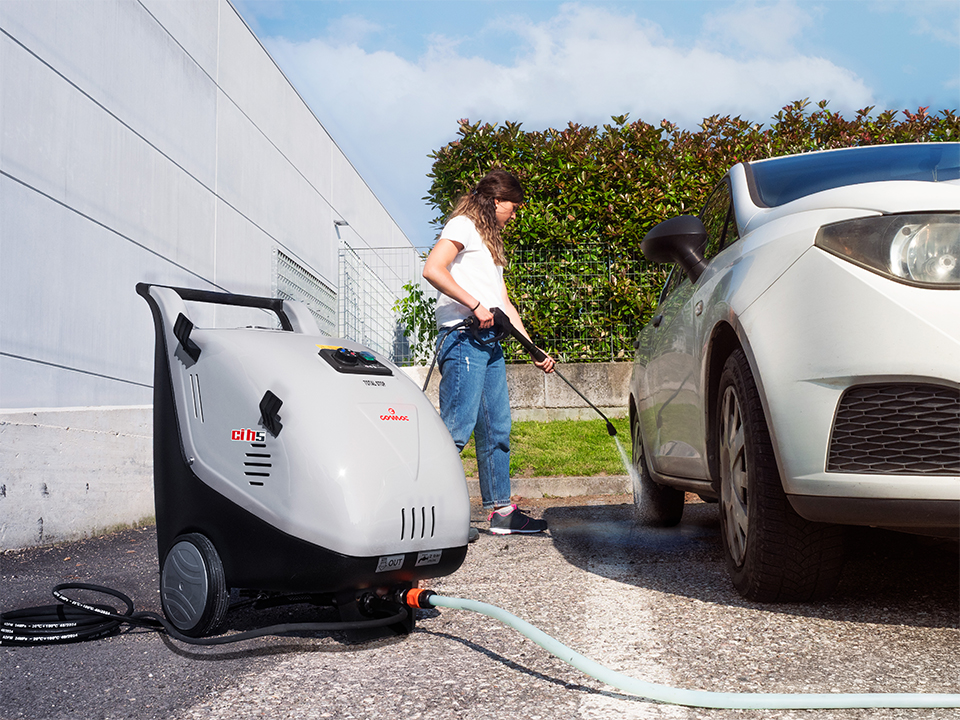
Advantages of electric pressure washers:
- Lighter and quieter than gas-powered models.
- Compact and easy to transport or store.
- Low maintenance, with no combustion engine to manage.
- Zero emissions: perfect for indoor or poorly ventilated areas.
Disadvantages of electric pressure washers:
- Generally less powerful than gas models, so not ideal for heavy-duty dirt or large surfaces. However, many professional electric pressure washers offer performance that rivals gas-powered units.
- Limited mobility: despite being easy to maneuver, they require access to a power outlet to operate.
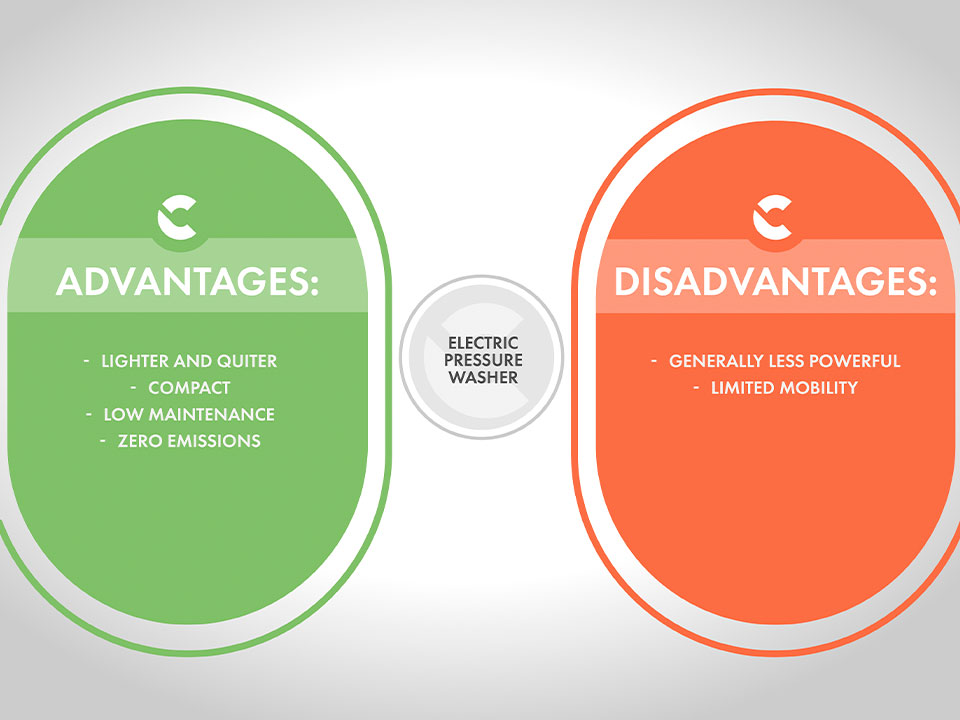
Electric pressure washer: hot or cold water?
Electric pressure washers are also available in hot or cold water versions, depending on your cleaning needs. Cold water electric models are the most common and are ideal for daily cleaning tasks, such as removing dust, mud, or light dirt from both indoor and outdoor surfaces.
Hot water electric models, on the other hand, are perfect for environments where maintaining high hygiene standards is essential or where it’s necessary to effectively remove grease, oil, and organic residues, such as in the food, pharmaceutical, or logistics sectors.
Gas vs electric pressure washer: which one is better?
There’s no one-size-fits-all answer to this question. Choosing between a gas pressure washer and an electric pressure washer depends on the environment in which it will be used and the type of cleaning tasks required. Here are some practical tips to help you decide which option is best for your needs:
- Gas pressure washer: this is the ideal solution for outdoor work, construction sites, agricultural areas, or large surfaces. It offers high power and full mobility even where electricity is not available, making it perfect for tough dirt and heavy-duty cleaning.
- Electric pressure washer: best suited for indoor environments or areas where low noise, compact design, and ease of use are essential. Since it produces no emissions, it’s safe to use in enclosed or poorly ventilated spaces.
In summary, gas pressure washers are particularly suitable for demanding tasks and locations where maximum independence from power sources is required, such as construction sites or large outdoor areas. Electric pressure washers, on the other hand, are an equally valid choice for professional use, especially where low noise, compactness, and zero emissions are a priority. In fact, many electric models, like those in the Comac range, are specifically designed for intensive and continuous use, delivering high performance even in the most challenging applications.
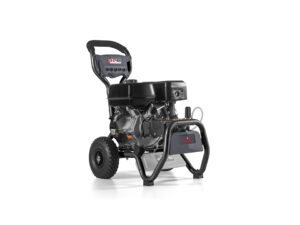
Best gas pressure washer from Comac: CI C40 EM THERMIC
Among the models in the Comac range, the CI C40 EM THERMIC is the ideal gas-powered pressure washer for professionals working outdoors without access to electricity. Powered by gasoline and equipped with a high-performance Rato engine, it delivers nearly 300 bar of pressure, ensuring outstanding results even in tough conditions. Powerful yet easy to handle, thanks to its inflatable wheels and sturdy frame, it’s perfect for heavy-duty applications in industrial, construction, or agricultural settings.
| Max pressure: | 280 bar |
| Max flow rate: | 960 l/h |
| Power consumption: | 10,2 hp |

Best electric pressure washer from Comac: CI C20
Compact, powerful, and easy to use, the CI C20 is Comac’s electric pressure washer designed for those who need professional performance in a user-friendly format. Thanks to its rugged design and practical V-shaped handle, it moves easily even in tight spaces or on uneven surfaces. With high pressure and generous water flow, it’s perfect for everyday cleaning in the automotive, industrial, logistics, and manufacturing sectors.
| Max pressure: | 150 bar |
| Max flow rate: | 630 l/h |
| Power consumption: | 3 KW |
How to recognize a professional pressure washer
Whether gas-powered or electric, choosing the right machine starts with understanding if it’s truly a professional pressure washer. These models stand out for specific features: a sturdy frame, wear-resistant materials, high-quality pumps, and the ability to operate for long periods without performance drops. They also offer greater long-term reliability and can tackle even the toughest dirt quickly and efficiently.
Want to learn more about the differences between professional and domestic models? Read our dedicated guide to professional pressure washers.
Looking for the right model for your needs? Explore the full range on the Comac pressure washers page.
Still unsure whether to choose a gas vs electric pressure washer? Contact us: Comac’s network of authorized dealers is ready to help you find the most suitable model for your cleaning tasks.
This post is also available in: Italian


